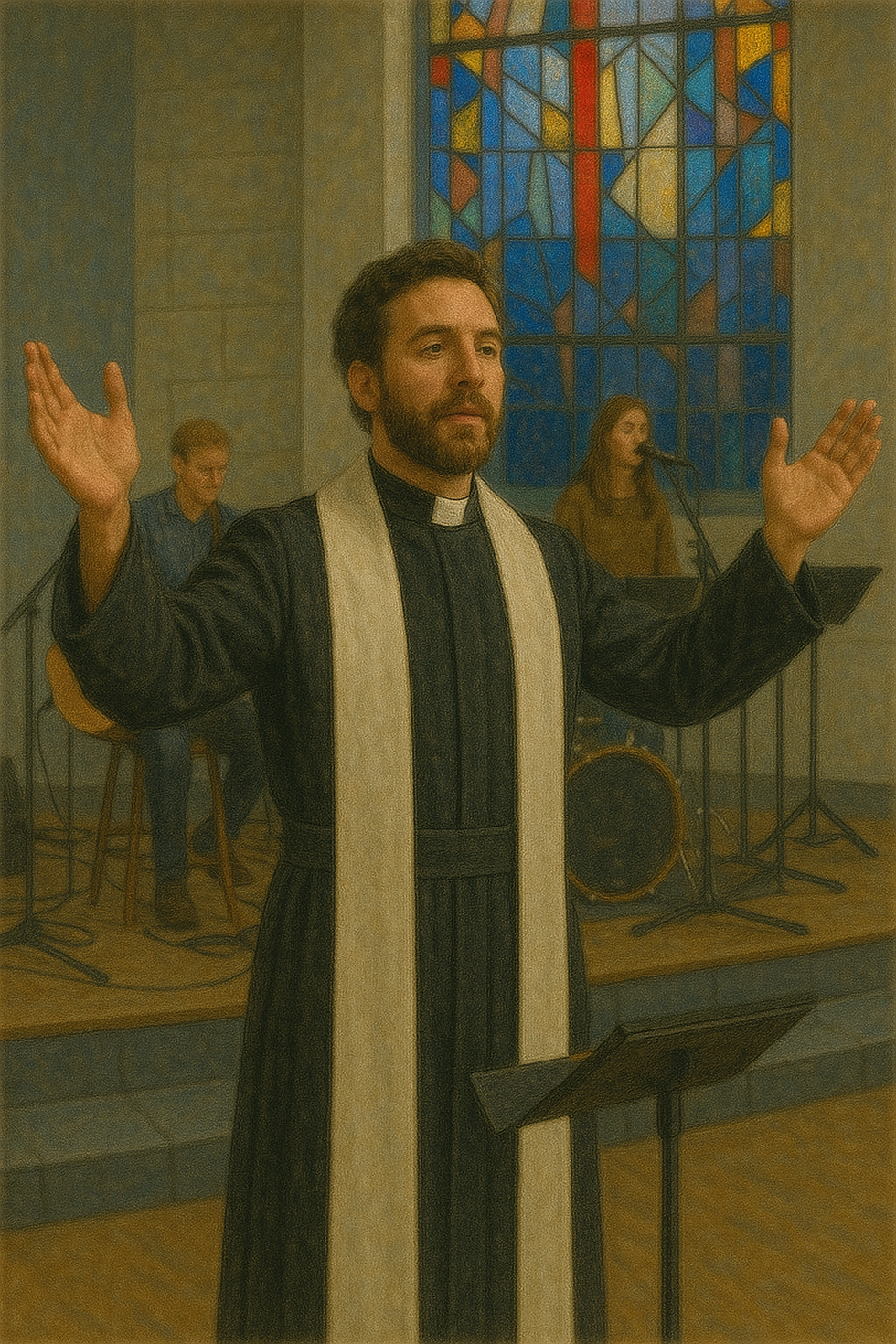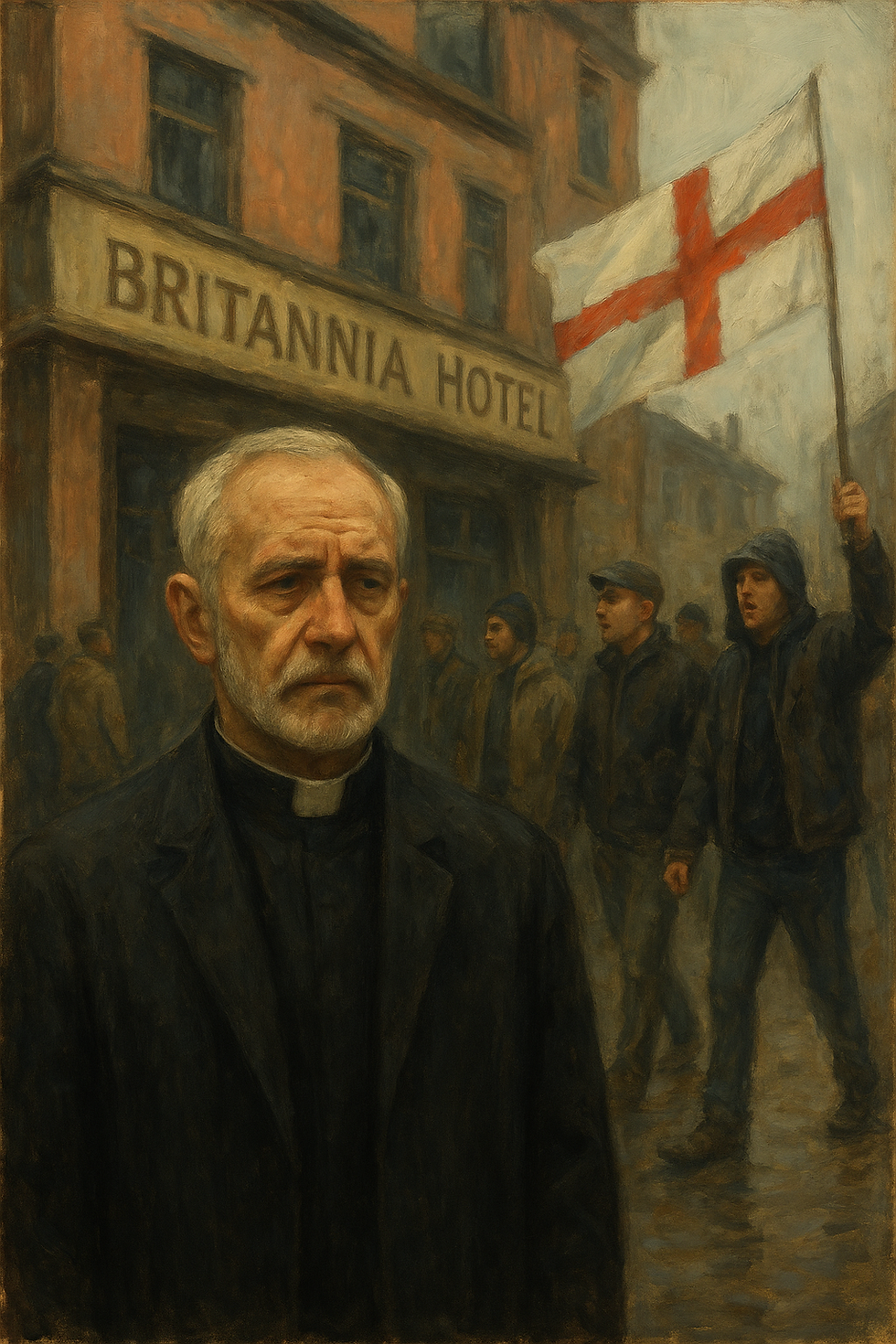East of Eden: Deacons
- Jon Swales
- Sep 16
- 10 min read

The First Word — Heralds
Two days before ordination,
six wait in cassocks
that itch against the skin.
They gather in the retreat house chapel
on the edge of Elmet and Aire.
The preacher has fallen ill.
So a retired priest—
grey-haired, shoulders rounded
by decades of ministry—
is asked to take his place.
He does not stride but shuffle.
Does not perform but simply stand.
The weight of years hangs on him,
yet his eyes carry gentleness,
as if sorrow has taught him
not to be harsh.
His voice is gravel,
weathered by funerals,
softened by baptisms,
tempered in hospice corridors
and at the bedside of the dying.
“Deacons are heralds of Christ’s kingdom,”
he begins, almost whispering.
“Not masters.
Not architects.
Heralds.
Messengers of Another’s reign.
I have proclaimed to hundreds,
and whispered to one—
needle marks on an arm,
a mother at her child’s grave.
The kingdom does not rest
on eloquence.
It rests on Jesus.
We only point.”
He lowers his eyes,
remembering faces
only he can see.
There is no bravado in him,
no air of expertise.
Only holy humility,
poured out drop by drop
into other people’s wounds.
⸻
Afterwards, over coffee,
the six sit together.
The kettle still clicks,
steam fogs the window.
The planter, tugging at his sleeve:
“I’ve never worn robes.
This isn’t my world.
But when he spoke—
did you feel it?
Like the Kingdom
shows up on pavements
and in prisons?”
The one wounded by church:
“Yes. And notice—
he never spoke about himself.
Always Christ.
That humility—
it makes me think
healing might be possible.”
The quiet one,
weighing desires and debates:
“When he said the kingdom
doesn’t depend on eloquence—
I needed that.
Maybe the herald only needs to point,
not solve everything.”
The one who doesn’t fit the mould,
fingers tapping the mug:
“He didn’t make it sound like a job.
More like a posture—
kneeling low,
speaking Christ’s name.
Maybe I can do that,
even if I don’t fit the mould.”
Silence again.
Steam rises.
Hearts restless, yet steadied.
The old priest has given them no manual.
But something more precious:
a glimpse of the Kingdom.
Assurance that even cracked vessels
carry living water.
The Second Word — Agents of Love
The old priest rises slowly.
Back bent,
hand steady on the lectern.
His voice is rough,
but steady.
“Deacons are called
to walk with bishop and priest,
to be heralds of Christ’s kingdom.
To proclaim the gospel—
not only in sermons,
but in the way you live.
Agents of God’s purposes of love.”
He pauses,
gazes at the window.
The last light of day
slants across the floor.
“The gospel is not opinion.
It is news.
The news that Jesus—
crucified,
yet risen—
is King.
The one who brings peace.”
He looks back at them.
His face creases.
He smiles.
“And when I say love,
I mean the kind
that changes people.
Sometimes swift as storm,
but mostly—
slow as dawn.
Love is the deacon’s way.
Let it flow through you.
Drop by drop,
into the cracks of human wounds.”
He lets the words rest.
Steps back.
Folds his hands.
The chapel stills.
Fifteen minutes of silence.
Breath like prayer.
Wood creaks.
No one moves.
At last they file out.
The night air cool,
stone walls damp.
Shoes scuff gravel.
The planter:
“Agents of love—
that sounds like sowing seed.”
The wounded one,
hand brushing the wall:
“He smiled when he said it.
Like he believed
love could actually heal.
I needed that.”
The quiet one,
half to himself:
“News, not opinion…
Yes.
That frees me.
I don’t need answers,
just courage to announce it.”
The one who doesn’t fit the mould,
keys jangling in his pocket:
“‘Slow as dawn’—
that I can live with.
No rush.”
They laugh a little.
Talk turns to cassocks,
supper,
the oddness of silence.
Down the lane
a lamp glows above a doorway.
The Bishop’s Mitre.
Steps quicken.
Voices blend.
Still thinking of love,
but ready for warmth,
and beer.
The Third Word — Needs and Hopes
The Bishop’s Mitre is busy.
Low beams,
old wood polished by hands and time.
Glasses clink,
laughter hums.
The old priest enters quietly.
Not in clericals,
just himself.
Still, heads turn.
At the bar,
he greets two men—
mud on their boots,
placards by the door.
They have come down from a protest.
Voices hoarse,
eyes still fierce.
He listens.
Nods.
Buys them each a pint.
“Thanks for standing up.
I’ll pray for you.
God bless.”
A hand on a shoulder,
then he moves on.
The ordinands make space at their table.
Pints raised.
“Thank you for your homilies,”
one says.
“You’ve given us yourself.”
He shrugs.
Smiles.
“I only spoke from the heart.”
He tells them of Durham Cathedral,
the awe of ordination.
“Once a deacon,
always a deacon.
Though truth be told—
we’re all forgeries.
Imperfect copies.
But God uses us still.
Remember this:
the stole placed crosswise,
diagonal over the heart—
that sign is never taken off.
Even if one day
you wear a bishop’s ring or mitre,
beneath it lies the mark of service,
the yoke of Christ the servant.”
The planter leans in:
“What about tonight’s theme—
the needs and hopes?”
The priest’s eyes brighten.
He begins:
“Deacons serve the place they’re set.
Not floating above it,
not sealed in churches,
but in streets,
schools,
estates.
Your task is to bring needs
into the Church’s prayer.
To carry hopes
into the Church’s heart.
When sorrow weighs heavy,
you shoulder it.
When hope flickers,
you fan it.
You listen.
You tell the truth—
sometimes gently,
sometimes sharp—
but always with love.
The deacon lives in three worlds:
the Church,
the world,
the Kingdom.
Bridging.
Interceding.
Translating.
Never so lost in theory
you miss the tears beside you.
Never so busy
you walk past the broken.
And the Church—
it must empower you.
Hear you.
Let you lead it back
to where Christ already walks.”
He stops.
Lets the words rest
amid the pub noise.
The quiet one whispers:
“That sounds costly.”
The priest nods.
“Of course.
Love always is.”
They raise their glasses.
“To love.”
Another round.
Laughter.
Football.
Cassock jokes.
Then the bell rings.
Last orders.
They drain their pints,
pull on coats.
The street outside is cool,
lamp steady in the dark.
They walk back together—
half laughing,
half pondering—
carrying needs and hopes
yet unnamed,
already entrusted
to God.
The Fourth Word — Love Made Visible
Morning breaks.
The chapel smells faintly of coffee,
polish,
and damp hymn books.
They gather again.
Someone suggests a song.
“Shine, Jesus, Shine.”
The bluetooth player streams to life.
They begin, hesitant.
The chorus rises—
thin, awkward.
A couple attempt the hand claps.
It only makes it stranger.
They grin, embarrassed,
but keep singing.
When the last line fades,
the old priest clears his throat.
He stands slowly,
palms resting on the lectern.
“Deacons,” he says,
“are to seek out the poor,
the weak,
the sick and the lonely,
the oppressed and powerless.
To reach into the forgotten corners,
so that the love of God
is made visible.”
He pauses.
His voice softens.
“This is the holy work:
to embody Christ.
Not in grand gestures,
but in compassion,
in presence,
in touch.
If you want a plan,
start with two questions:
Who among us is most vulnerable?
And how can we respond
with love?”
He leans closer,
eyes bright with memory.
“The deacon is like a rescue ship.
Not tied in safe harbour,
but out in storm seas.
Searching for the battered,
the bruised,
those close to the rocks.
It is not reckless,
but it is risky.
For that is the way of Christ.”
He lets the silence breathe,
then names the faces that haunt him:
“The isolated elderly.
The addict.
The mentally ill.
The prisoner.
These are your parish too.
The rough pub,
the care home,
the bedsit,
the cell.
In those corners,
the love of God becomes tangible—
a food parcel,
a hug,
a listening ear,
a shoulder to cry on,
help with the bills,
a warm meal,
a word about King Jesus’ kindness.”
He smiles again,
gently.
“Deacons make the love of God visible.
That is your calling.
That is your joy.”
The Fifth Word — Pastoral and Prophetic
The dining room smells of soup,
bread warm on the table,
coffee brewed too strong.
Plates clatter.
Chairs scrape.
The six ordinands eat together,
half hungry,
half still mulling the morning talk.
The planter says first:
“Funny, isn’t it?
We talk of pubs and prisons—
but Sunday still comes round.
We’ll have to preach.
Pray.
Lead services.
I’ve never worn robes,
let alone led a liturgy.”
The old priest smiles.
Butter knife resting in his hand.
“Ah yes.
The outward call is only half.
The other half
is here.
Among the people of God.
Deacons share
in the pastoral ministry of the Church.
They lead God’s people in worship.
They preach the word.
They bring the needs of the world
before the Church in intercession.”
He sips water,
eyes kind.
“You’ll spend plenty of time outside—
on estates,
in care homes,
with those forgotten.
But you are also called inside.
To serve the covenant community
with tenderness in private,
and with leadership in public worship.”
The wounded one frowns.
“But worship feels so ordered.
So structured.
What if people need freedom?”
The priest nods.
“Yes.
Worship is never a free-for-all.
Order is a vessel.
But it is to be filled
with Spirit-fire.
The deacon learns to hold both—
the form,
and the flame.”
The quiet one leans forward.
“And intercession?
What does that mean, really?”
He sets the knife down.
“It means listening.
Listening to the world.
Then carrying what you’ve heard
into the prayers of the Church.
Today it may be
the cry of the poor,
the wounded,
the overlooked.
It may also be,
as Pope Francis reminds us,
the cry of the earth itself.
You teach the Church to pray
by naming what the world groans with.
And you take that suffering seriously.
Always seriously.
Because our God listens seriously.”
He folds his hands.
Voice lowers.
“Let me show you.”
He prays:
“Father of Creation,
to you be praise,
honour,
and glory.
You call deacons
to lead the flock in worship,
to preach your word,
to pray before you.
By your Spirit,
help us read your Word
and read the world,
that our worship may reflect your wonder,
and the context in which we stand.
Through Christ our Lord.
Amen.”
Silence holds for a moment,
longer than grace before a meal usually lasts.
The planter breaks it,
smiling awkwardly:
“And now…
pass the salt?”
Laughter ripples.
Lightness returns.
But the words
have sunk deep.
The Sixth Word — Servants
It is the final session.
Nerves are sharper now.
The ordination service waits
just one night away.
Cassocks are tugged straight,
pages flipped,
breath drawn too quickly.
Laughter is thinner,
words fewer.
They file into the chapel,
hearts restless,
hands clammy.
The old priest is already there,
standing by the lectern.
His voice is low,
steady as ever.
“Deacons,” he says,
“share in the pastoral ministry
of the Church.
You are called to serve God’s people
with compassion in private—
a hand on the shoulder,
a word of comfort—
and also in public worship,
leading prayer,
preaching the word,
bringing the world’s cries
before the throne of God.
Every moment of life can be holy.
Every task can be worship.
But you—
you are asked to help the Church
see this truth.
To hold together
order and Spirit,
liturgy and fire.
When you preach,
you open Scripture
so that it speaks again.
When you intercede,
you carry the brokenness of the world
into the heart of the Church—
and into the heart of God.
You must listen first.
Listen to the poor.
Listen to the wounded.
Listen to the cries of creation itself.
Then teach the Church
how to pray those cries aloud.
This is no light task.
It is pastoral,
prophetic,
priestly in its own way.
The deacon is to be a bridge
between people and God,
between suffering and hope.
Take the world seriously.
Take God seriously.
And help the Church
hold them together in prayer.”
He folds his hands,
bows his head.
The ordinands sit in silence,
restless yet steadied.
The Seventh Word — Sent
Morning breaks pale and cool.
The suitcases are zipped,
cassocks folded with trembling hands.
The ordination is hours away.
The six gather once more
in the retreat house lounge.
Steam from mugs,
bags stacked by the door.
The air is thick with nerves.
The old priest enters quietly,
an envelope in each hand.
He smiles, lines deep in his face.
“These are my letters to you,”
he says softly.
“Words for today,
and for the days to come.”
One by one,
he presses them into their hands.
Paper, weightless—
yet heavy with love.
The planter opens his first.
Inside:
The deacon journeys with seekers,
hungry for faith they cannot name.
Walk beside them,
until they find their rest in Him.
The wounded one reads slowly:
Some long for forgiveness,
others for freedom,
others for a new identity.
Stay close.
Share Jesus, who came not to be served
but to serve,
and to give his life as ransom for many.
The quiet one unfolds his letter:
At the table of the Eucharist,
you will serve bread and wine.
It is holy mystery—
communion with Christ Himself.
Offer it with awe,
with tenderness,
with joy.
The one who doesn’t fit the mould finds:
Go to the sick,
to the housebound,
to those forgotten.
Carry Christ to them.
Prefer the margins.
Bring hope where the world
has left none.
The words sink deep.
Each holds the letter as if it burns.
The priest clears his throat.
“You will proclaim the gospel inside and out.
You will pray,
you will break bread,
you will sit by bedsides.
It is not pomp.
It is not prestige.
It is service.
Never forget—
once a deacon, always a deacon.
Even should you wear mitre or cope,
the call of Christ the servant
still rests on you.”
He blesses them,
voice low,
hands trembling slightly.
The minibus waits outside.
They climb in,
bags loaded,
letters tucked into pockets.
The road winds to the city.
Stone towers rise.
The cathedral gleams in morning light.
Crowds gather.
Robes swirl.
Trumpets echo.
The organ thunders.
Pomp.
Procession.
Incense curling to the rafters.
And there,
by a side door,
stands the old priest.
He does not wear a cope,
nor lift a staff.
He only nods,
smiles,
and whispers as they pass:
“Praying for you.”
They go forward.
They kneel.
Hands are laid.
Voices speak ancient words.
They rise—
changed.
No longer just six ordinands,
but deacons.
Servants.
The great doors open.
The crowd spills out,
the bells peal,
the city bustles.
Yet beneath the grandeur
they carry something quieter:
the memory of Christ who knelt to wash feet,
the stole placed crosswise on their shoulder—
sign of the servant,
the diagonal yoke of Christ—
and a diaconal call that endures,
even should mitre rest on their head:
to serve in forgotten corners,
to make Christ visible,
to be cracked vessels
pouring out living water.







Comments